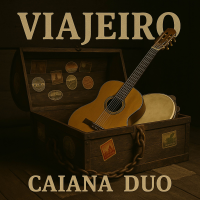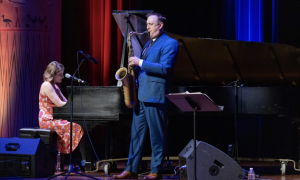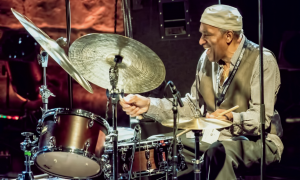Home » Jazz Articles » Catching Up With » Susan Alcorn: Another Way
Susan Alcorn: Another Way

Nameless and formless, that is the place to be. Ready yourself for the fleeting moments where it descends on you, goes through your instrument, and out to hearts, the audience, the world, and the universe.
—Susan Alcorn
Susan Alcorn
guitar, steel1953 - 2025
I never heard of Susan till one Sunday night at the legendary CBGB's Sunday Night Avant-Garde series where she performed with tenor saxophonist,
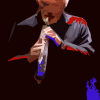
Joe Giardullo
saxophoneThis interview is a long-time coming. Let me introduce you to one of my favorite musicians, Susan Alcorn.
All About Jazz: Give us some background on yourself, such as how did you get started playing steel guitar? Was that your first instrument? Did you play with country bands? How did you get into improvised music?
Susan Alcorn: I guess my first instrument was the piano, though I never got good at it. As a toddler, I used to sit at my mother's feet and move the pedals when she played, usually church music or light classical music. In third grade I played viola in the elementary school orchestra (Muhlenberg Elementary School), then in 4th grade changed to the shiny looking trumpet in the velvet case. I played this until 8th grade. I was first chair, but got kicked out of the school band which ended my formal training.
Even as a child, I was attracted to music that was out of the ordinary, at least to me at that time. Everyone else liked the Beatles, so I liked the Dave Clark Five and the Animals. When

Frank Zappa
guitar, electric1940 - 1993

John Coltrane
saxophone1926 - 1967
I played with country bands for 20 years. Country music is deceptively simple, and it's not as easy as a lot of jazz musicians think it is. It's also direct and to the point. There is improvisation, but unlike jazz where a solo may be 96 bars or more, in the country music I played, you had to fit it into maybe 4, 8, or 12 bars.
Though there is improvisation in every form of music, even western classical, and though there was plenty of improvisation within the confines of the genre, I guess I got into improvised music through playing straight ahead jazz (poorly, as anyone I've ever played with will tell you) which is also, to a large extent, genre-specific. Through that, my ears started leading me toward, to my ears, the more adventurous music. When I started to play music by

Ornette Coleman
saxophone, alto1930 - 2015

Albert Ayler
saxophone, tenor1936 - 1970

Henry Threadgill
woodwindsb.1944

Charlie Haden
bass, acoustic1937 - 2014

Steve Lacy
saxophone, soprano1934 - 2004
Then I met

Pauline Oliveros
accordion1932 - 2016
AAJ: Did you ever play standard jazz tunes?
SA: Yes, I did. In the early eighties, I bought a real book, went to jam sessions, played some straight -ahead gigs, but I don't think that was my strong point. In some ways, it became like a game of mathematics, and, try as I did, I couldn't successfully contain myself with that even though I love it.
AAJ: Have you studied harmony and theory?
SA: I studied, and continue to study, harmony and theory, learning it first through the Nashville number system, but not with a teacher, and not in any organized way—just one of the glaring weaknesses in my education. I listen to a lot of music, and if something touches me in some way or I find it personally interesting, then I'll study it. I have no formal theory behind much of what I do, I just go with what sounds good.
AAJ: So many jazz musicians have degrees in performance nowadays. Did you go to college?
SA: I went to Northern Illinois University. I was interested in studying music, but at the time (the early seventies) it wasn't possible to study, at least at the university level, the kind of music I was interested in at the time, namely blues, country, folk, and what would later be called Americana. There was quite a good jazz program at that school, but you had to audition and had to be able to sightread which I was unable to do. My degree was in political science and history.
AAJ: You tour a lot? Do you like it?
SA: I have toured a lot, but not as much as the true road warriors.
When people who are not musicians ask me about touring, especially Europe or exotic locations, they assume that I'll do all the tourist things, but a typical day of touring is waking up early in the morning, flying, driving, or taking a train to the next gig. Arriving in the afternoon, checking into a hotel if there's time. I must make sure I get a decent amp, do the sound check, maybe grab a sandwich, play the gig, tear down my equipment, go back to the hotel or go out to dinner with others late at night and sleep for a few hours, and then repeat the same every day. I don't mind it because that's what we to do, but it's work. The pleasure is the music.
This does not mean that there are no joys in touring, but it's hard work and, at times, grueling, and unexpected hassles are always around the corner. Traveling by car for hours, taking trains with excess equipment and nowhere to put it, dealing with airlines, an instrument that sometimes never reaches its destination. Along with sleeplessness and jet lag.
Recently I was at an airport in Germany where they took out my steel guitar bars and tried to stick them into the stand for the drum stool. They acted like it was some sort of gun (though the inside was hollow and you could see through it). I was then lectured: "Why are you taking this stool onto the plane? Don't you know that we already have seats on the plane?" I had to struggle to keep my mouth shut. Things like that can be stressful
However, it does tend to expand your horizons. I meet incredible musicians, wonderful people, and often friends who are also traveling. Most of my traveling (and gigs in general) is for solo gigs, but I enjoy traveling with a band—each night a different city, different audiences, and being part of a musical group where things change every night. Maybe there's a certain fearlessness that comes with traveling.
AAJ: Name some of the experiences you've had during your career?
SA: Well, I've played in bars where people have been shot and killed. I've played for rodeos (usually instrumentals) where you start when the cowboy and horse or bull come out of the chute, and then you stop when the rider falls. The longest being maybe 14 seconds, so those were great gigs if you think about how much you get per note. I've met people who were great inspirations such as Pauline Oliveros and got to visit places I never could have imagined nor afforded if I wasn't going there for a gig. And I've been fortunate to have had the opportunity to play with some incredible musicians whose playing and whose approach to music is a constant source of inspiration.
AAJ: What are your plans?
SA: Well, I'm recording and playing gigs, writing music, and always trying to learn. Covid, at least for now, has changed the way we interact with each other. And I think it has also affected music itself in subtle ways. We all have a limited time here on Earth, and limited time when we make music in the way we like (though I think of people like

Marshall Allen
saxophone, altob.1924
AAJ: The music business has changed so much over the last few years. How do you feel about it?
SA: Yes, it has changed drastically over the last fifty years. When I started, I knew musicians playing locally, mostly in clubs, who could put a roof over their head, feed their families, and even retire with a modicum of comfort. I don't see much of that these days.
Nowadays, I think musicians must be more proactive with the business side of things. They need to think outside the old boundaries and come up with their own ways of managing their affairs. Big record labels don't control things like they used to, which I find refreshing. Recording is cheaper, and I think finding an audience or other musicians to connect with is easier than it was. Adjusting to these new business dynamics is not always an easy thing to do, but younger musicians coming up, who have never known anything different, seem to swim comfortably in those waters. The younger ones are the future so I'm reassured by that.
Financially, I have always been on the bottom rung of the ladder, so some of the things that hurt other musicians, low-paying gigs, etc., are things that I'm quite accustomed to.
AAJ: Any advice for the young players coming up?
SA: I'm probably the last person anyone should go to for advice, but what I advise students and anyone who asks me is this: learn and respect your instrument. Treat it like a partner, a loved one, and not like an object to be mastered. A musical instrument is a sentient being—allow the instrument to tell its own story. Allow the vibrational universes contained within to come out of the instrument and tell their stories too. Think about why you are playing and what is it that you want to express. Think of emotions in music, and then think about and, as well as you can, approach that state that is beyond emotion and beyond a narrow concept of beauty. Nameless and formless, that is the place to be. Ready yourself for the fleeting moments where it descends on you, goes through your instrument, and out to hearts, the audience, the world, and the universe. Now and forever.
Because of the pandemic, everything has slowed down, but things are improving. If you see Susan Alcorn's name performing, don't hesitate. Go see her. Trust me, you will be floored.
https://soundcloud.com/susan-alcorn/chaconne-por-una-cabeza-breath
Tags
Catching Up With
Susan Alcorn
Dom Minasi
Joe Giardullo
Frank Zappa's
John Coltrane
Ornette Coleman
Albert Ayler
Henry Threadgill
Charlie Haden
Steve Lacy
Pauline Oliveros
Comments
PREVIOUS / NEXT
Support All About Jazz
 All About Jazz has been a pillar of jazz since 1995, championing it as an art form and, more importantly, supporting the musicians who make it. Our enduring commitment has made "AAJ" one of the most culturally important websites of its kind, read by hundreds of thousands of fans, musicians and industry figures every month.
All About Jazz has been a pillar of jazz since 1995, championing it as an art form and, more importantly, supporting the musicians who make it. Our enduring commitment has made "AAJ" one of the most culturally important websites of its kind, read by hundreds of thousands of fans, musicians and industry figures every month.



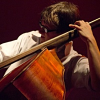




 Buy Now
Buy Now

